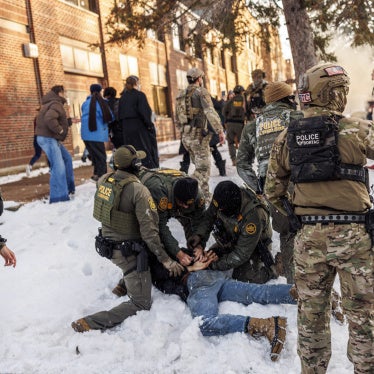Human Rights Watch's executive director, Ken Roth, reviews Alan Dershowitz's book, "Rights from Wrongs" in an article for The Washington Post Book World.
How, in these circumstances, can we best defend our rights? Claiming that rights are divinely inspired or "natural" does little good, since their content depends on the eye of the beholder. Invoking the law isn't more helpful, since laws might be unwise and, in any event, can be amended. Alan Dershowitz champions an alternative approach in his latest book, "Rights From Wrongs." He would ground rights in our historical experience. Rights, in his view, reflect the lessons we have learned about which constraints on state power best avoid grievous governmental wrongs.
A historically based justification for rights won't stop the conversation the way invoking God might. It requires argument rather than assertion. But it's a better way of reaching those who might not share the same understanding of God's will. As Dershowitz explains, "the best defense of rights is an active and persistent advocacy rather than a passive recourse to 'higher authority.' "
But if rights depend on history lessons, those lessons can change with time. Rights may strengthen in response to serious governmental abuse but may also weaken in the face of a serious threat. There is no "one-way ratchet," as Dershowitz puts it. As the world changes, arguments that were persuasive yesterday may no longer convince today. An effective rights advocate must stay attuned to the turns of history.
Dershowitz's insight is understood by the international human rights movement but tends to be overlooked in a country like the United States, with its well-developed legal system. Because many Americans think of rights as a specialty left to lawyers and judges, our arguments for rights are less sharp than they might be. But in countries that typically demand attention from groups like the one I work for, Human Rights Watch, there is no functioning judicial system. Rights depend on the ability to persuade -- to demonstrate that firm constraints on state power serve the public interest.
Since Sept. 11, public advocacy for rights is needed in the United States as well. As Dershowitz notes, "Our past experience suggests that . . . the courts . . . will generally not interfere with the executive's handling of a genuine emergency while it still exists." True to form, the courts so far have addressed the administration's detention and interrogation practices only tangentially. We will be remiss, Dershowitz suggests, if we wait for the courts to take on the depravity at Guantanamo and Abu Ghraib. We must address it ourselves.
But Dershowitz ultimately disappoints because he never applies the insights of history to these pressing rights issues. Dershowitz is best known in recent years for his advocacy of torture warrants -- judicial orders that, he claims, would limit torture by regulating when it might be used. Yet his new book never mentions the idea. The reader is left guessing what experience teaches. Is the lesson of Abu Ghraib that the door to torture cannot be opened even a little without legitimizing torture and inviting a deluge of abuse? What should we make of Israel's efforts to justify "moderate physical pressure" for suspects believed to know of an imminent terrorist attack -- a supposedly rare exception to the absolute ban on torture that soon led to the torture of some 80 to 90 percent of Palestinian security detainees? Dershowitz doesn't say. Instead, he addresses animal rights and the rights of people needing organ donations -- interesting topics, but hardly burning issues of the day.
What about preventive detention? Dershowitz lists the World War II internment of Japanese Americans as one of the grievous wrongs that we need rights to prevent. He also denounces "the ethnic profiling and detention of Arabs and Muslims" following Sept. 11. But he offers no view of the Bush administration's radical claim that it can unilaterally declare anyone, anywhere -- any of us -- an "enemy combatant" and detain us summarily until the end of the "war" against terrorism, which may never come.
Yet Dershowitz is right to warn against complacency when our rights are at stake. Our rights are no stronger, he observes, than "my ability to persuade you that history has shown them to be important." From the roundup of people deemed communist and anarchist during the Palmer Raids of 1919-20 to the Japanese American internments to the witch hunts of the McCarthy era, the U.S. government has too often responded to national security threats with rights restrictions that proved unnecessary. The Bush administration should heed that historical lesson. Instead, at great risk to the rights of us all, it seems to be repeating the mistakes of the past.







